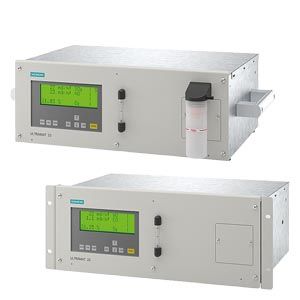
The ULTRAMAT 23 uses two independent measuring principles which work selectively. Infrared measurementThe measuring principle of the ULTRAMAT 23 is based on the molecule-specific absorption of bands of infrared radiation, which in turn is based on the "single-beam procedure". A radiation source (7) operating at 600 °C emits infrared radiation, which is then modulated by a chopper (5) at 8 1/3 Hz. The IR radiation passes through the sample chamber (4), into which sample gas is flowing, and its intensity is weakened as a function of the concentration of the measured component. The reciever chamber - set up as a two- or three-layer detector - is filled with the component to be measured. The first detector layer (11) primarily absorbs energy from the central sections of the sample gas IR bands. Energy from the peripheral sections of the bands is absorbed by the second (2) and third (12) detector layers. The microflow sensor generates a pneumatic connection between the upper layer and the lower layers. Negative feedback from the upper and lower layers leads to an overall narrowing of the spectral sensitivity band. The volume of the third layer and, therefore, the absorption of the bands, can be varied using a "slide switch" (10), thereby increasing the selectivity of each individual measurement. The rotating chopper (5) generates a pulsating flow in the receiver chamber that the microflow sensor (3) converts into an electrical signal. The microflow sensor consists of two nickel-plated grids heated to approximately 120 єC, which, along with two supplementary resistors, form a Wheatstone bridge. The pulsating flow together with the dense arrangement of the Ni grids causes a change in resistance. This leads to an offset in the bridge, which is dependent on the concentration of the sample gas. Note The sample gases must be fed into the analyzers free of dust. Condensation in the sample chambers must be prevented. Therefore, the use of gas modified for the measuring task is necessary in most application cases. As far as possible, the ambient air of the analyzer should also not have a large concentration of the gas components to be measured. ULTRAMAT 23, principle of operation of the infrared channel (example with three-layer detector) Automatic calibration with air (AUTOCAL)The ULTRAMAT 23 can be calibrated using, for example, ambient air. During this process (between 1 and 24 hours (adjustable), 0 = no AUTOCAL), the chamber is purged with air. The detector then generates the largest signal U0 (no pre-absorption in the sample chamber). This signal is used as the reference signal for zero point calibration, and also serves as the initial value for calculating the full-scale value in the manner described below. As the concentration of the measured component increases, so too does absorption in the sample chamber. As a result of this preabsorption, the detectable radiation energy in the detector decreases, and thus also the signal voltage. For the single-beam procedure of the ULTRAMAT 23, the mathematical relationship between the concentration of the measured component and the measured voltage can be approximately expressed as the following exponential function: U = U0 · e-kc c Concentration Changes in the radiation power, contamination of the sample chamber, or aging of the detector components have the same effect on both U0 and U, and result in the following: U’ = U’0 · e-kc Apart from being dependent on concentration c, the measured voltage thus changes continuously as the IR source ages, or with persistent contamination. Each AUTOCAL thus tracks the total characteristic according to the currently valid value. Temperature and pressure influences are also compensated in this way. The influences of contamination and aging, as mentioned above, have a negligible influence on the measurement as long as U’ remains in a certain tolerance range monitored by the unit. The tolerance range between two or more AUTOCALs can be individually configured on the ULTRAMAT 23 and an alarm message output. An alarm message is output when the value falls below the original factory setting of U0 < 50% U. In most cases, this is due to the sample chamber being contaminated. Calibration The units can be set to automatically calibrate the zero point every 1 to 24 hours, using ambient air or nitrogen. The calibration point for the IR-sensitive components is calculated mathematically from the newly determined U’o and the device-specific parameters stored as default values. We recommend checking the calibration point once a year using a calibration gas. (For details on TГњV measurements, see Table "Calibration intervals (TГњV versions)" under Selection and ordering data). If an electrochemical sensor is installed, it is recommendable to use air for the AUTOCAL. In addition to calibration of the zero point of the IR-sensitive components, it is then also possible to simultaneously calibrate the calibration point of the electrochemical O2 sensor automatically. The characteristic of the O2 sensor is sufficiently stable following the single-point calibration. The zero point of the electrochemical sensor only needs be checked once a year by connecting nitrogen. Calibration Oxygen measurementThe oxygen sensor operates according to the principle of a fuel cell. The oxygen is converted at the boundary layer between the cathode and electrolyte. An electron emission current flows between the lead anode and cathode and via a resistor, where a measured voltage is present. This measured voltage is proportional to the concentration of oxygen in the sample gas. The oxygen electrolyte used is less influenced by interference influences (particularly CO2, CO, H2 and CH4) than other sensor types. Note The oxygen sensor can be used for concentrations of both > 1% and < 1% O2. In the event of sudden changes from high concentrations to low concentrations (< 1%), the sensor will, however, require longer running-in times to get a constant measured value. This is to be taken into consideration when switching between measuring points in particular, and appropriate rinsing times are to be set. ULTRAMAT 23, principle of operation of the oxygen sensor Electrochemical sensor for H2S determinationThe hydrogen sulfide enters through the diffusion barrier (gas diaphragm) into the sensor and is oxidized at the working electrode. A reaction in the form of a reduction of atmospheric oxygen takes place on the counter electrode. The transfer of electrons can be tapped on the connector pins as a current which is directly proportional to the gas concentration. Calibration The zero point is automatically recalibrated by the AUTOCAL function when connecting e.g. nitrogen or air. It is recommendable to check the calibration point monthly using calibration gas (45 to 50 vpm). The AUTOCAL (with ambient air, for example) must be performed every hour. In so doing, you must ensure that the ambient air is saturated in accordance with a dew point of 11 °C. If this cannot be constantly ensured with dry ambient air, the adjustment gas must be fed through a humidifier and subsequently through a cooler (dew point 11 °C). If the accompanying gas contains the following components, the hydrogen sulfide sensor must not be used:
Operating principle of the H2S sensor Paramagnetic oxygen cellIn contrast to other gases, oxygen is highly paramagnetic. This property is used as the basis for the method of measurement. Two permanent magnets generate an inhomogeneous magnetic field in the measuring cell. If oxygen molecules flow into the measuring cell (1), they are drawn into the magnetic field. This results in the two diamagnetic hollow spheres (2) being displaced out of the magnetic field. This rotary motion is recorded optically, and serves as the input variable for control of a compensation flow. This generates a torque opposite to the rotary motion around the two hollow spheres by means of a wire loop (3). The compensation current is proportional to the concentration of oxygen. Calibration The calibration point is calibrated with the AUTOCAL function when processing air (corresponding to calibration with the electrochemical O2 sensor). In order to comply with the technical data, the zero point of the paramagnetic measuring cell must be calibrated with nitrogen weekly in the case of measuring ranges < 5% or every two months in the case of larger measuring ranges. Alternatively, inert gases (such as nitrogen) can be used for AUTOCAL. As the limit point of the measuring range remains largely stable, an annual limit point adjustment will suffice. Operating principle of the paramagnetic oxygen cell Cross-interferences, paramagnetic oxygen cells
Cross-sensitivities (with accompanying gas concentration 100%) ULTRAMAT 23 essential characteristics
|
| Каталог 2018 | Каталог 2017 | Каталог 2016 | Каталог 2015 | Каталог 2014 | Каталог 2013 | Каталог 2012 | Сертификат | Контакты | Карта сайта | Поиск |


